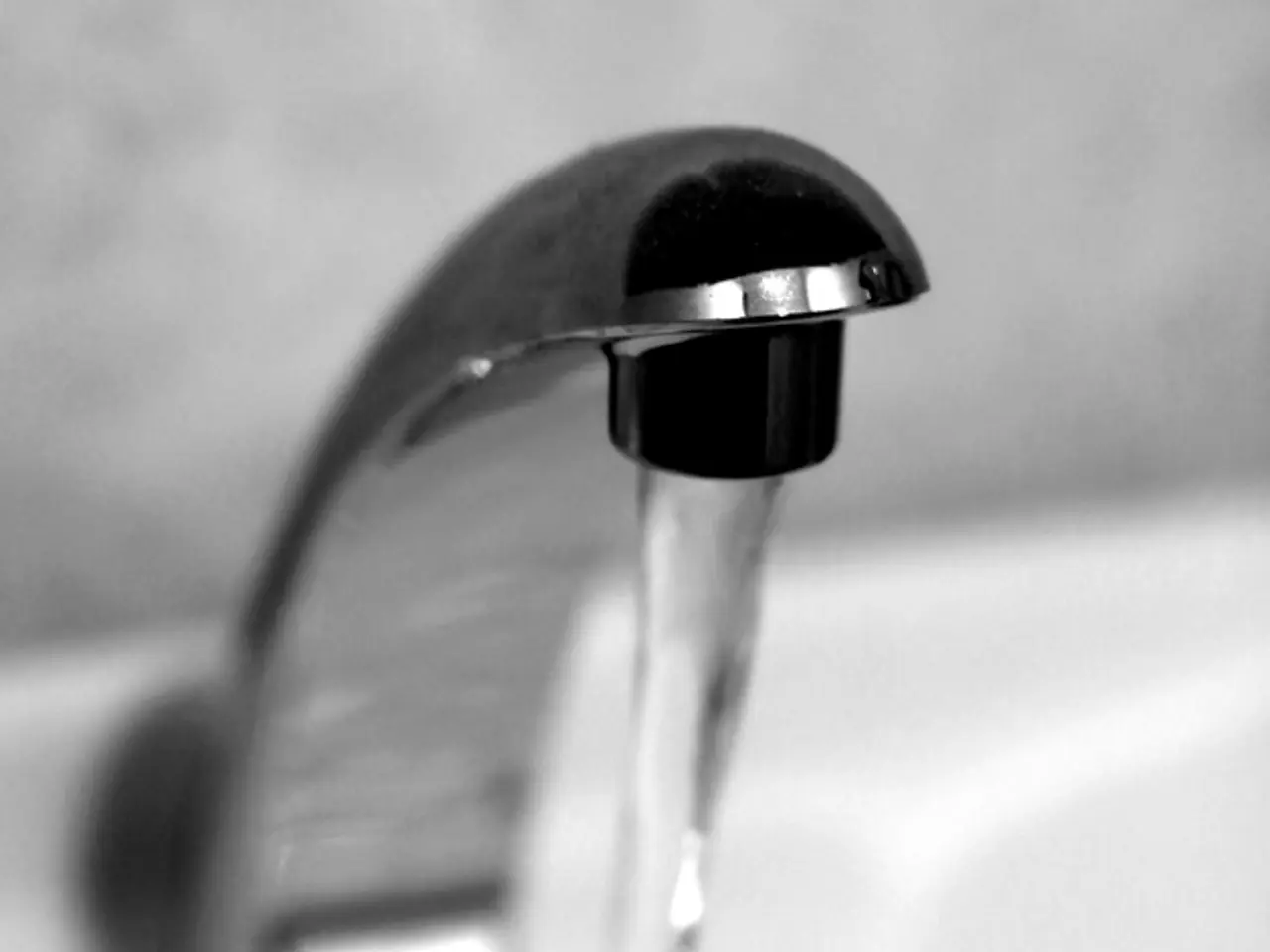PFAS contamination leads to prohibition of tap water usage in 12 Ardennes towns
In regions like the Meuse and Ardennes in France, a growing concern over the presence of PFAS, or 'forever chemicals', in local water supplies has prompted the deployment of state-of-the-art treatment technologies. These innovative solutions, developed by French companies such as WSP and Veolia, aim to address the contamination and ensure the safety of drinking water.
The affected communes, totalling 16 in the Meuse and Ardennes, include Villy, Malandry, Blagny, Linay, Haraucourt, Bayonville, Beffu-et-Le-Morthomme, Landres-et-Saint-Georges, Thénorgues, Imecourt, Verpel, the Hamlet of Sivry (Buzancy), Juvigny-sur-Loison, Louppy-sur-Loison, Han-lès-Juvigny, and Remoiville.
One of the key solutions being implemented is WSP's PFASER system, an electro-oxidation wastewater treatment using boron-doped diamond (BDD) electrode reactors. This technology offers rapid, on-site elimination of PFAS and other persistent contaminants, with electrodes proven to last over six years continuously. It is modular, durable, and cost-effective, and uniquely, it also removes perchlorate byproducts, ensuring treated water meets stringent international standards for drinking water or environmental discharge.
Veolia's Drop® technology, recently launched in Europe, is another patented solution capable of destroying targeted PFAS compounds with an efficiency of up to 99.9999%. This process is part of Veolia’s broader expertise in hazardous waste treatment, including PFAS elimination, and is being deployed across their incineration sites.
In addition, wet processing soil remediation systems by companies like CDE are being utilised to address PFAS contamination in soils that can leach into water sources. These multi-stage wet processing plants scrub and wash contaminated soils, isolate PFAS, and manage contaminated water through advanced filtration, also recovering valuable materials in the process.
While direct cost estimates for treatment projects in the Meuse and Ardennes regions are not explicitly available, the advanced modular nature of systems like PFASER suggests potential scalability and cost-efficiency for regional deployment. A recent $35 million charcoal-filter plant opened by Veolia in the U.S., designed to remove PFAS from contaminated water for about 100,000 people, provides a rough benchmark for the scale of investment required for effective PFAS treatment facilities.
However, the small rural communes without large budgets are bearing the brunt of the costs, according to Annick Dufils, the mayor of Malandry. The communes must engage all possible means to make the water conform to health standards, with affected municipalities providing two liters of drinking water per day to each inhabitant. In Villy, the cost for bottled water refund over six months is approaching 9,000 euros.
The origin of the pollution is yet to be confirmed, but it could be linked to the spreading of paper sludges suspected of containing PFAS on agricultural parcels near the captages of drinking water. There have been shortcomings in the spreading and controls of the paper sludges, with specifications not being respected, burial, and fraud, according to Richard Philbiche. The mayors of the affected communes have called on the State to help them finance these health measures.
As the situation unfolds, a committee to monitor PFAS will be organised at the start of the school year, and the State does not subsidise the measure of water distribution but ensures support to local authorities in managing this situation. The legal limit for PFAS in tap water is 100 nanograms per liter (ng/l), but levels in Villy commune, Ardennes, exceed legal limits by 27 times.
[1] WSP. (2021). PFASER: Electro-oxidation wastewater treatment using boron-doped diamond (BDD) electrode reactors. Retrieved from https://www.wsp.com/our-expertise/environment/water/water-treatment/pfaser
[2] Veolia. (2021). Veolia's Drop® technology. Retrieved from https://www.veolia.com/en/innovation/drop-technology
[3] CDE Global. (2021). Wet processing soil remediation systems. Retrieved from https://www.cdeglobal.com/industries/environmental/soil-remediation
[4] Veolia. (2021). Veolia opens PFAS treatment plant in the U.S. Retrieved from https://www.veolia.com/en/news/veolia-opens-pfas-treatment-plant-in-the-us
- French companies WSP and Veolia, working in environmental science and policy-and-legislation, are developing innovative technologies to address the growing concern over PFAS contamination in local water supplies in the Meuse and Ardennes in France.
- WSP's PFASER system, a modular and cost-effective electro-oxidation wastewater treatment technology, offers rapid, on-site elimination of PFAS and other persistent contaminants in the workplace-wellness and health-and-wellness sector.
- Veolia's Drop® technology, part of their broader expertise in hazardous waste treatment, can destroy up to 99.9999% of targeted PFAS compounds, making it a significant solution in the campaign against climate-change and mental-health issues related to environmental contamination.
- CDE's wet processing soil remediation systems are being used to address PFAS contamination in soils, helping to safeguard the environment and prevent further leaching into water sources.
- In the midst of rising costs related to PFAS treatment, the small rural communes lack the necessary budgets, and mayors are calling on the State for financial assistance to address health and safety concerns, particularly in the areas of general-news and politics.




